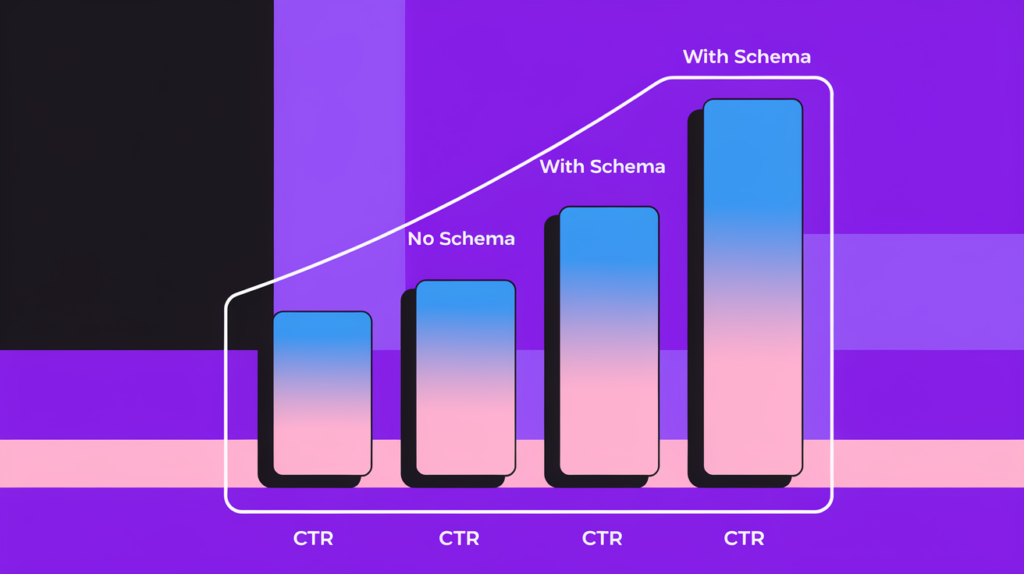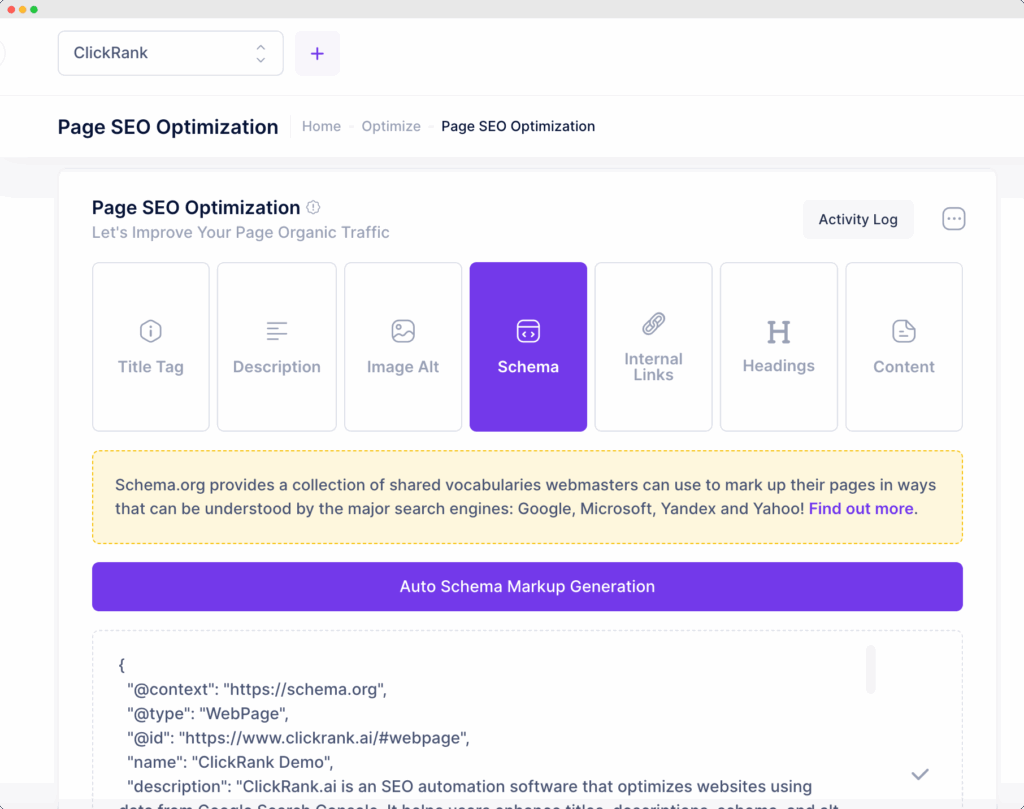Ever wonder how some websites effortlessly steal the spotlight on Google’s search results? The secret isn’t magic it’s Schema Markup! As Neil Patel says, “Schema markup is the unsung hero of SEO, but it’s just one piece of the puzzle.” A solid SEO strategy involves multiple elements working together, from image SEO and internal linking to mastering header tags and canonical tags.
Google’s John Mueller has consistently emphasized the advantages of schema, but depending solely on it for SEO success is a common pitfall. You also need to understand tactics like how to improve CTR, the difference between Title and H1 tags, optimizing for Google indexing, and even evaluating the best CMS platforms for your site. With recent changes like Google removing breadcrumb navigation on mobile SERPs, staying updated is crucial. Let’s delve into the critical role of schema markup, its impact on search performance, and why tools like ClickRank are indispensable for crafting a well-rounded SEO strategy.

What is Schema Markup?
Schema markup is a type of structured data vocabulary that helps search engines understand web page content and context. As SEO expert Aleyda Solis explains, “It’s like adding a roadmap to your website.”
The Power of Schema Markup in SEO
Schema markup, a form of structured data, provides search engines with additional context about the content on your website. By doing so, it enhances your chances of appearing in enriched search results. For instance, a product page with schema markup can display pricing, ratings, and availability directly in SERPs. This added information makes your listing stand out, driving higher click-through rates (CTR).
1. Enhancing SERP Visibility
John Mueller has consistently emphasized that schema’s primary value lies in its ability to improve how search results are displayed. Rich results, such as star ratings, FAQs, and how-to guides, capture user attention and can significantly boost your CTR. Mueller stated, “Schema gives search engines more context about a page but doesn’t inherently increase its ranking.” While schema alone doesn’t influence ranking directly, the improved visibility can lead to better overall performance.
2. Improving Content Understanding
Search engines rely on structured data to better comprehend your content’s context. For example, article schema helps Google categorize your blog post accurately, increasing its chances of appearing for relevant queries. Mueller also noted, “Schema isn’t magic; it’s a way to help search engines understand your content better.” This enhanced understanding can improve how your content is indexed and displayed.
3. Optimizing for Emerging Technologies
Schema plays a crucial role in optimizing content for voice search and AI-driven features. Voice assistants often rely on structured data to retrieve precise answers. As Mueller highlighted, “Structured data will become increasingly important for features like voice search and direct answers.” Schema types like FAQ and Speakable are already paving the way for this future.
Analyze your domain's health score and fix all issues with a single click.

Why Schema Alone Isn’t Enough
While schema is an essential tool, it’s not a standalone solution for achieving SEO success. Mueller has frequently stressed that schema markup should complement a broader SEO strategy. Here’s why you shouldn’t make schema your only focus:
1. Schema Is Not a Direct Ranking Factor
Mueller has made it clear that schema does not directly influence rankings. Instead, its value lies in enriching search result presentations. “You won’t rank higher just because you have a schema,” he stated. This means that even if your schema is perfectly implemented, it won’t compensate for poor-quality content or technical SEO issues.
2. Content Quality Matters More
No amount of structured data can save low-quality content. Google’s algorithms prioritize relevance, user intent, and engagement over metadata. Mueller advises, “If your content is lacking in relevance or quality, schema won’t save it.” Focus on creating high-value content that addresses user needs and solves their problems.
3. The Complexity of Manual Schema Implementation
Adding schema markup manually can be tedious, especially for websites with extensive content. Common mistakes, such as incomplete tags or misaligned data, can lead to errors in Google Search Console. Mueller often cautions against overusing schema types, noting, “Stuffing multiple schema types on a page might confuse Google’s interpretation.” Proper implementation requires precision and regular updates.
4. Neglecting Other SEO Fundamentals
Overemphasizing schema can lead to the neglect of other critical SEO components, such as:
- Technical Optimization
- Mobile Optimization
- Backlink Building
- Content Strategy

Types of Schema Markup
While Google supports a total of 35 different schema types, it’s important to note that you don’t need to implement all of them. Instead, focus on the ones that are most relevant to your content. In this section, we will delve into some schema types that are applicable to the majority of websites, helping you enhance your SEO strategy effectively.
Organization Markup
Organization markup is a form of schema that supplies Google with detailed information about your organization. By implementing this markup on your site, you can convey important specifics such as:
- Organization Name
- Logo
- Contact Information
- Location
- Social Media Profiles
Other Relevant Details When someone searches for your company, Google utilizes the information provided through organization markup to generate knowledge panels. These panels appear on the right side of the search results page and highlight key details about your business. The knowledge panel offers potential customers and interested parties quick access to essential information, enhancing their understanding of your business at a glance. Organization schema markup is particularly beneficial for businesses, nonprofits, educational institutions, or any group.
Product Markup
Product markup enhances how your products are displayed in Google search results, providing users with essential information at a glance. This type of schema allows you to showcase details such as:
- Product Image
- Ratings
- Price
- Shipping Information
- Return Policy
- Availability
This schema markup is particularly beneficial for e-commerce websites; it helps attract customers by offering them vital product information directly in the search results.
Review Markup
Review markup enhances your search result snippet by adding a star rating at the bottom of your entry. This feature provides potential customers with insights into what others think about your product, service, or business, helping them make informed purchase decisions. This type of schema is used for websites offering content related to books, movies, products, courses, and beyond.
Course Markup
Course markup provides Google with in-depth details about educational offerings from institutions or online platforms. Key details encompassed in this markup include the course title, a succinct description, the name of the instructor or institution, and other pertinent information. With this schema, Google can present this information directly in search results, giving potential learners a quick overview of what the course involves.
Article Markup
Article markup supplies Google with comprehensive details about an article’s content, including elements like the title, featured image, author, and publication date. This structured data allows Google to showcase this information directly within the search results, enhancing visibility and engagement. This markup is especially beneficial for various types of content, including news articles, blog posts, and sports articles, helping readers quickly find relevant and timely information.
Common Mistakes to Avoid
Let’s highlight some pitfalls to steer clear of:
- Incomplete/inaccurate information: One of the most common mistakes is providing incomplete or inaccurate information in schema markup. This can confuse search engines and result in incorrect representations in search results. Ensuring that your markup thoroughly and accurately describes your content is essential for effective SEO.
- Duplicate schema markup: Using duplicate schema markup can lead to confusion for search engines and potentially cause undesired outcomes in indexing or ranking. It’s important to audit your site’s schema to identify and eliminate any duplicates, ensuring that each piece of content is marked up with a unique and accurate schema type.
- Inconsistent formatting: Inconsistent formatting in schema markup can hinder search engines’ ability to interpret your structured data correctly. Using varying formats for structured data on the same site can create complications and diminish the effectiveness of your schema. Maintaining consistency across all schema implementations is crucial for clarity and accuracy.
- Over-optimization: Over-optimizing schema markup can lead to negative consequences, as search engines may perceive this as a manipulation attempt. This includes stuffing keywords, adding irrelevant schema types, or exaggerating claims. Such practices can result in penalties and a loss of rankings. It is essential to maintain a balanced approach by focusing on relevant and user-centric schema that genuinely reflects the content, enhancing the search experience without crossing the line into manipulation.
- Ignoring schema updates: The world of SEO and structured data is continually evolving, with search engines frequently updating their guidelines and the types of schema markup they recognize. Ignoring these updates can leave your schema outdated and less effective. To maximize the benefits of schema markup, it’s critical to stay informed about changes, review performance regularly, and make necessary adjustments to keep the structured data.
Best Practices for Schema Markup
To maximize the benefits of schema while avoiding common pitfalls, follow these best practices:
- Prioritize Relevance: Ensure the schema type aligns with the primary intent of the page. For example, use FAQ schema for pages with frequently asked questions and Product schema for e-commerce listings.
- Maintain Accuracy: Provide precise and up-to-date information within your structured data. Incomplete or incorrect schema can lead to errors or penalties.
- Avoid Overloading Pages: Implement only the necessary schema types. Overusing schema can confuse search engines and dilute the page’s focus.
- Stay Informed: Regularly review Google’s guidelines for structured data to ensure compliance and take advantage of new schema types as they become available.
- Test Your Schema: Use tools like Google’s Rich Results Test and Schema.org Validator to validate your structured data and identify potential issues.
Measuring Schema’s Impact
To evaluate the effectiveness of schema on your website:
- Monitor Google Search Console: Check for rich results coverage and address any errors or warnings.
- Track Click-Through Rates (CTR): Compare the performance of pages with schema markup against those without.
- Analyze Organic Traffic: Use analytics tools to assess whether schema has driven more traffic to your site.

Automating Schema Implementation with ClickRank
Given the challenges of manual schema implementation, automation tools like ClickRank can simplify the process. ClickRank not only automates schema creation but also ensures accuracy and compliance with Google’s guidelines. This allows you to focus on other pressing SEO tasks without sacrificing the benefits of structured data.
How ClickRank Integrates with Your WordPress SEO
A large number of SEO workflows are built on WordPress, using plugins like RankMath or Yoast SEO to handle on-page basics. ClickRank SEO WordPress is designed to work with your existing setup, not replace it. Our platform integrates with a single JavaScript snippet, making it compatible with WordPress and any other CMS. This means you can keep using your favorite plugins while it automates the more tedious aspects of SEO, such as real-time schema generation and technical audits. It’s a powerful combination: your go-to WordPress tools for hands-on control, and ClickRank for AI-driven precision and efficiency.
How ClickRank Works
- Automated Schema Generation: It scans your website to identify content and automatically generates the appropriate schema markup. Whether it’s product, FAQ, or event schema, the tool ensures everything is correctly formatted.
- Real-Time Updates: As your content evolves, it keeps your schema up-to-date. This ensures that your structured data reflects the latest information, reducing the risk of outdated or incorrect markup.
- Error Prevention: It minimizes common schema errors, such as incomplete or misaligned tags, which could lead to warnings in Google Search Console.
- Wide Schema Support: From Product and Review schema to How-To and Speakable schema, ClickRank supports a broad range of types, making it versatile for different website needs.
- Integrated Validation Tools: It includes built-in validation tools to ensure your schema markup is eligible for rich results and complies with Google’s requirements.
Benefits of Using ClickRank
- Time-Saving: Automates a labor-intensive process.
- Accuracy: Reduces the risk of errors that can harm SEO performance.
- Efficiency: Frees up resources to focus on content, link building, and technical optimization.
Conclusion
Schema markup is an invaluable asset for improving SERP visibility and enhancing Google’s understanding of your content. However, it should complement, not replace, a comprehensive SEO strategy. By automating schema implementation with ClickRank, you can reap the benefits of structured data without the hassle, freeing you to focus on other critical aspects of SEO. Remember, exceptional content, technical optimization, and strategic link building remain the cornerstones of successful SEO. Use schema as a tool to support these efforts, not as a crutch. With a balanced approach and the right tools, you can maximize your site’s potential and achieve sustainable growth in organic search.
FAQs
What is schema markup in SEO?
Schema markup is a type of structured data added to your website’s HTML to help search engines better understand your content. It doesn’t directly improve rankings, but it increases your chances of earning rich results like star ratings, FAQs, or event info in search snippets boosting visibility and click-through rate (CTR).
Does schema markup improve SEO rankings or just appearance?
Schema markup doesn't directly increase your Google rankings , but it significantly enhances how your content appears in search results. By enabling rich results, it helps your page stand out visually, often leading to higher CTRs and more qualified traffic which can indirectly support SEO performance.
Which types of schema markup are most important for SEO?
The most impactful schema types for SEO include FAQPage, Article, LocalBusiness, Product, Review, and Breadcrumb schema. These not only improve clarity for search engines but also unlock enhanced SERP features that can drive more organic clicks.
How do I implement schema markup on my website?
The easiest and most SEO-safe way to implement schema is using JSON-LD, Google's recommended format. You can add it manually to your page HTML or use tools like RankMath, Yoast, or Google’s Structured Data Markup Helper. Always validate your markup using Google’s Rich Results Test before publishing.
Should FAQ schema content be visible on the page?
Yes to comply with Google guidelines, the content marked up with FAQ schema must be visible to users. Hiding it (e.g., using display:none) may result in manual penalties or your rich results being removed. Always match your schema markup with actual, readable content on the page.
Is schema markup still worth it in 2025?
Absolutely. While Google has reduced how often some schema types appear (like FAQs on commercial pages), schema markup remains valuable for enhancing E-E-A-T signals, supporting voice search, and improving accessibility. It's especially useful for local SEO, featured snippets, and AI-driven SERPs.


